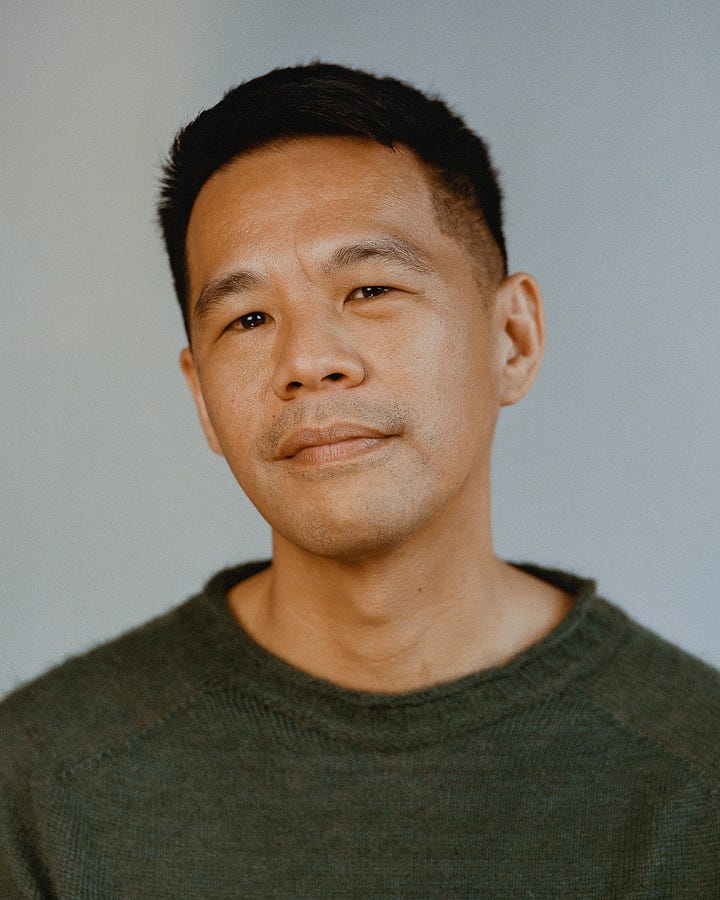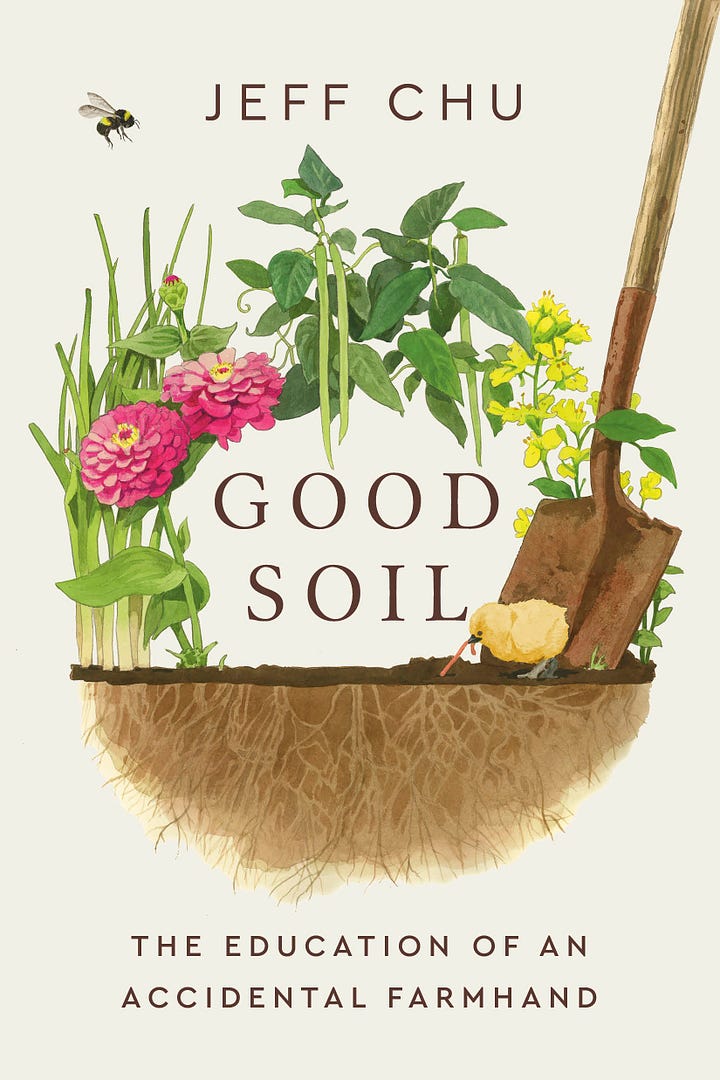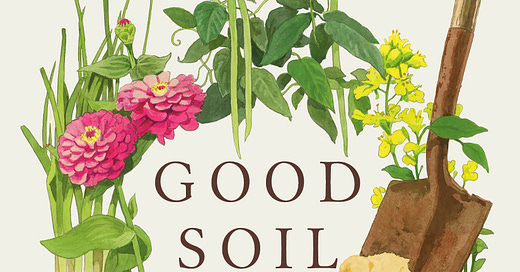My friend Jeff Chu is out this week with a new book that I think you’ll love.
Jeff is a writer, and more recently, an ordained minister. He’s featured in my book, The Exvangelicals, where he reflected on themes from his first book, Does Jesus Really Love Me? A Gay Christian’s Pilgrimage in Search of God in America. We’ve spoken before for NPR’s All Things Considered about Jeff’s friendship with the late Christian writer Rachel Held Evans, and his labor of love to complete her final work, Wholehearted Faith, after she died suddenly in 2019.
Jeff’s new book, Good Soil: The Education of an Accidental Farmhand, is timely and touching and a breath of fresh air. We chatted about it over email, and I’m sharing that conversation here.


Sarah McCammon: This lovely book introduces us to the people you met and the lessons - both spiritual and horticultural - you learned at Princeton Theological Seminary’s Farminary project, which it describes as “a place where theological education is integrated with small-scale regenerative agriculture to train faith leaders who are conversant in the areas of ecology, sustainability, and food justice.”
You moved from a very fast-paced career - journalism - into theology and farming - which move much more slowly. What did that shift in pace teach you about the way our culture often prioritizes productivity and speed?
Jeff Chu: We weren’t made for this! I do not believe humanity has evolved to absorb information and news and chatter as quickly as it is being thrust upon us by alerts and notifications. I do not believe we are wired to take all this in—especially the enormity of global grief and tragedy—and process it in any healthy way. So, in a sense, my time at seminary and as a farmhand was a reset button. I got to slow down—and I wish that for everyone.
I know that not everyone has the luxury of leaving their jobs for three years of study, but I do think we all have the ability to turn off the notifications on our cell phones and even remove apps. (I took Twitter and Facebook off my phone a few years ago, which was one of the best decisions I ever made. I did keep Instagram, because I like seeing pretty pictures.) I do think we can all think more intentionally about what is consuming our time and what might be diverting our attention.
The other thing leaving my full-time job in New York and shifting my attention to the Farminary forced me to contemplate: What does “productivity” actually mean? I had spent all my days creating something nobody really needed; sure, there were some nice stories in that magazine, but it wasn’t essential to anyone. I like to think that in the years since I became a farmhand, I’ve become a better husband and a better friend (you’ll have to fact-check that with them) because I’ve recalibrated how I understand “productivity.” What contributes to human flourishing? What does it take to be whole in this world? What can I offer to others that isn’t about monetary gain, financial value, or economic efficiency but prioritizes grace and hope and love?
SM: We’ve known each other for awhile and I know you’re an introvert. You know I have those tendencies as well. But I was a little surprised to read about just how nervous you were when your dear friend, the late writer Rachel Held Evans, asked you to speak to a gathering of people wrestling with spirituality. I’m curious - when you decided to enroll in seminary, how were you thinking about the typically public-facing role of clergy and how you’d make that work for you?
JC: I wasn’t thinking about it! I was in denial. I’ve spent nearly my entire journalistic career reveling in asking other people questions while avoiding answering them myself—and I am not a natural or comfortable public speaker.
My first semester, I had to take a speech class, and one of our first assignments was to read a passage from Scripture aloud to the class. There was something in there about joy, and when I had finished, one classmate said, “You’re talking about joy but I don’t sense any joy.” And I said, “Oh, that’s my RBF.” She said, “What’s RBF?” I said, “Resting bitch face.” She clutched her pearls, the professor had to stifle her laughter, and it became clear that I had a lot of work to do on my public presentation.
Toward the end of seminary, when it became clearer to me that this calling into some form of public ministry wasn’t going away, I began to make my peace with the fact that I’d have to spend a big part of my life doing uncomfortable things, and as I’ve often said in my teaching, discomfort isn’t the same thing as danger. But I still get super-nervous every time I step in front of an audience.
One thing that has helped—and I offer this to anyone else who might feel as if they never really belong in a room: If you have known unbelonging, I suspect you probably know how to read the room. That’s a superpower that folks who have spent their lives in the center never know. We have spent much of our lives studying spaces, perceiving group dynamics, and honing our observational skills—perhaps for the sake of survival! That’s something we now get to use not just for our own survival but also for the sake of others’ flourishing. We see the person who might be quietly hurting. We can pick out the ones who also don’t feel at ease. We get to come alongside those who have always been wallflowers like we have—and we have the honor of letting them know, somehow, that they’re not alone.
SM: You’ve written movingly about reconciling your sexuality with your faith and family history. You write now about feeling out of place at times, even in a progressive seminary - not “queer enough” for the queer students, not conservative enough for the Asian students, too old for the recent grads and too young for the career-changers, etc. My particulars are different but the feeling you described resonated; I often feel that parts of me fit well in certain places but my whole person rarely finds a place she feels at home. What did the Farminary teach you about overcoming that sense of not fitting in? And do you think everyone (or most people) secretly feels that way?
JC: I have no idea if everyone feels like a misfit! I hope not, because it kind of sucks. Or maybe others are just better at hiding it than I am. What I learned on the farm is a sense of being appropriately small. It’s hard to spend time on that land—or, probably, any piece of land—and not feel a sense of wonder at all that happens. For me, all it takes is a few seconds of pause: I can just stop and look up, see how quickly the clouds run across the sky and observe the light shifting constantly, listen to the rustle of the trees and to the birdsong, and it changes my perspective.
On the farm, I realized two other things: 1) My fixation on being a misfit had a self-absorption to it that faded in the presence of so much interdependent life. I had to confront the reality that there was so much going on beyond me, and I could either choose to keep my gaze fixed firmly (some might even say myopically) inward or I could let myself fall into the company of the world. 2) I have long told other people how beloved they are, particularly to the God whom I believe made us and cherishes us, yet I really have struggled to believe it myself. Thing is, how much power do I want to cede to others? How much do I want to allow the voices that remind me of my un-belonging to take precedence over the voice of God who constantly tells a different story—one of belonging, one of care, one of ultimate love?
SM: One of the insights you share from farming is that planting crops in fertile soil necessitates a cycle that includes death and decay and sometimes darkness. It made me think about how leaving behind former communities and ways of thinking can feel like death. How did this experience shift the ways you think about loss and change?
JC: There is grief and loss when we realize that our views have shifted, or we no longer belong among people with whom we once shared deep convictions, or we are even cast out. But so often, we don’t make adequate room to grieve these things. In a world that is so prone to seeing sharp contrasts, it can be uncomfortable to say, Yes, it was good to say goodbye, but there are also things that I miss. Yes, I had to put an end to that, but there were things that I liked about it too.
The compost pile taught me that the process of change takes time. It’s also a work of collaboration, between microbes and worms, water and warmth. So why do we so often try to go it alone?
Another thing that I often see happening is a ranking of grief, a hierarchy of loss, such that we say, Well, someone else is going through something much worse. While that might be true, I don’t actually see the ultimate benefit in ranking or minimizing grief. Just because someone else seems to be going through something incredibly hard, that doesn’t make your burden, however petty it might seem in comparison, any lighter. Now, I wouldn’t necessarily recommend broadcasting all your griefs on social media. This is where the cultivation of friendship matters. We all need those spaces where we can say the honest thing, have it be held with grace, and be accompanied through all manner of grief.
To grieve isn’t just a reality; it’s a necessity of being human. We are in the midst of Lent, a season that begins with an outright acknowledgment: We will all die. As it says in the book of Genesis, from dust we came, and to dust we shall return. But we experience little deaths every single day. It might be the extinguishing of a longtime dream or the puncture of a cherished illusion, a beloved pet who dies (we’re still mourning our Fozzie, who died last June) or a project that doesn’t come to fruition, a relationship that frays or a cherished sweater that you left on an airplane. Do they all matter in exactly the same way? Of course not. But I wish for everyone the space to grieve losses big and small, because not doing so has its own costs.
SM: The Farminary is such a unique concept - learning theology through farming. Are there ways in which you think this kind of embodied, hands-on learning might be helpful to other areas of study - or is there something unique about theology?
JC: So much of modern learning is about the intellect. For a long time, because of my own body issues, some of which I write about in the book, I preferred to think of my body as merely a carrying case for my brain. Now, though, I am convinced re-engaging our bodies is so vital, especially for those of us who have a hard time with some aspect of our bodies. To use one’s arms and legs to dig in the soil is different from reading about what’s happening in the soil. To go up and down a city’s streets, observing and perceiving and absorbing, would be, for an urban-planning student or even a sociologist, different from poring over a textbook about streets and city life. To experience a building would be, for an architecture or design student, different from looking at renderings. To walk through a forest and pick up leaves and have an up-close look at bark would be, for someone studying botany or dendrology, vastly different from just paging through images of plants and trees. How do the things you encounter make you feel? What do the smells and the sounds awaken in you?
One other thing I’ll say: Having something to do with our bodies while also studying did a magical thing in unlocking conversation. I was able to have discussions with my fellow students that were on another level than we would have been able to access if we were sitting at desks. And in my church work now, I’ve learned that even sitting and feasting around a table can be transformative—a different way of engaging the body and the senses, for sure, but one that also creates a different kind of space for conversation.
Good Soil: The Education of an Accidental Farmhand by Jeff Chu is out March 25, and available here.


